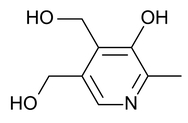The Fund-raising BBQ
A fund-raising BBQ is a popular way of obtaining money for research into common cancers, in particular prostate and breast cancer.
BBQs produce many toxic substances including heterocyclic amines (HCAs), polycyclic aromatic hydrocarbons (PAHs) and nitrosamines.

Heterocyclic compounds consist of one or more ring structures that contain different elements. In heterocyclic amines (HCAs) one of those elements is (usually) nitrogen. Pyridoxine (vitamin B6) is a HCA so not all HCAs are toxic.
Toxic HCAs are formed from cooking red meat on high temperatures and can also be formed during the smoking of meat. They are created when amino acids, sugars and creatine or creatinine (found in meat) react. 1
PhIP is one of the most abundant HCAs in cooked meat. HCAs are have a concentration that is measured in parts per billion in grilled and BBQ meats.

Polycyclic aromatic hydrocarbons (PAHs) are compounds consisting of only carbon and hydrogen that consist of multiple aromatic rings. They are produced by the incomplete burning of organic matter. There are several hundred compounds with varied degrees of toxicity. A number of PAHs are found as contaminants of vegetable oils. 2
Naphthalene (found in moth balls) is the simplest PAH consisting of two fused benzene rings.

Nitrosamines are organic compounds that contain a nitroso group (-N=O) which is attached to a second nitrogen atom.
N-Nitrosodimethylamine (NDMA) is a nitrosamine. It is very toxic causing damage to the liver and is a known carcinogen. NDMA is found at low levels in cured meat, fish, beer and tobacco and tobacco smoke.
NDMA can contiminate drinking water at very low concentrations and is difficult to detect and remove. It is not biodegradable, cannot be removed through carbon filtration and travels through soils.
Acid in the stomach causes nitrosamine compound formation but can be inhibited when the concentration is low such as in low-protein diets and a high-fruit diet due to the vitamin C content. A high-fat diet (greater than 10%) substantially increases nitrosamine formation. 3 ~ 4 ~ 5
NDMA can be produced by the chlorination of water.
In October, 2015, 22 scientists from ten countries met at the International Agency for Research on Cancer (IARC) in Lyon, France, to evaluate the carcinogenicity of the consumption of red meat and processed meat. Processed meat includes bacon, ham, hotdogs, sausages, salami, corned beef and canned meats. Processing can include smoking, salting, curing, canning, preserving and fermentation. Sodium nitrate (E250) is used as a preservative.
The majority of the Working Group concluded that there is sufficient evidence in human beings for the carcinogenicity of the consumption of processed meat. It also concluded that there is limited evidence in human beings for the carcinogenicity of the consumption of red meat. 6
 In addition to the problems with consuming processed meat, high-temperature cooking introduces additional dangers. Even the smoke from BBQs or living nearby a restaurant can cause health problems. If you are pregnant, it is advisable to stay clear of BBQ smoke. Airborne products from frying hamburgers, bacon and soybean burgers were tested for mutagenicity (the ability to change DNA). The fumes generated by frying pork and beef were mutagenic but the soy burgers were not.
In addition to the problems with consuming processed meat, high-temperature cooking introduces additional dangers. Even the smoke from BBQs or living nearby a restaurant can cause health problems. If you are pregnant, it is advisable to stay clear of BBQ smoke. Airborne products from frying hamburgers, bacon and soybean burgers were tested for mutagenicity (the ability to change DNA). The fumes generated by frying pork and beef were mutagenic but the soy burgers were not.
A Polish study showed not only a significant decrease in birth weight associated with barbecued meat consumption in pregnancy but even a greater decrease in birth weight as a result of exposure to airborne PAHs as a result of cooking. 8
Cooking meat produces PhIP which is one of the most abundant HCA in cooked meat. This induces cancer of the colon, prostate and mammary glands in rats. PhIP has also been implicated in the initiation and progression of breast cancer in humans. 9 10
A 2011 paper investigated the consumption of red meat as well as cooking methods on prostate cancer. 11
Their findings showed that a weekly consumption of:
- 3 or more servings of red meat,
- 1.5 or more servings of processed meat,
- 1 or more servings of grilled red meat,
- 1 or more servings of well done red meat
were each associated with an approximately 50% increased risk of developing advanced prostate cancer when compared with men who ate no red meat.
DNA adducts are modifications of the DNA that result from exposure to carcinogens. The level of DNA adducts in normal cells can serve as a marker for a significant exposure to carcinogens. Meat high in PhIP (a HCA) is directly related to PhIP-DNA adduct levels in prostate cells. The following paper suggests that grilled red meat consumption is an important factor in prostate cancer for humans. 12
A similar conclusion was reached in regard to breast cancer in the following paper. Consumption of processed meat, fried and stir-fried meat and HCA intake were correlated with the level of DNA adducts in breast tissue. 13
Last updated on Saturday 7 September 2024 at 20:52 by administrators
Footnotes
- National Cancer Institute (2017) Chemicals in Meat Cooked at High Temperatures and Cancer Risk – National Cancer Institute [online]. Available from: https://www.cancer.gov/about-cancer/causes-prevention/risk/diet/cooked-meats-fact-sheet (Accessed 24 April 2018).
- Pandey, M. K. et al. (2004) Detection of polycyclic aromatic hydrocarbons in commonly consumed edible oils and their likely intake in the Indian population. Journal of the Amerian Oil Chemists’ Society. 81 (12), 1131–1136.
- Park, J. et al. (2015) Distribution of seven N-nitrosamines in food. Toxicological research. 31279–288.
- Kim, S. H. et al. (2017) Inhibitory effects on N-nitrosodimethylamine formation by decrease of salted-fermented fish products and increase of condiments in kimchi. Food Science and Biotechnology. 261447–1455.
- Shao, X. et al. (2021) Insight into the mechanism of decreasing N-nitrosodimethylamine by Lactobacillus pentosus R3 in a model system. Food control. 121107534.
- Bouvard, V. et al. (2015) Carcinogenicity of consumption of red and processed meat International Agency for Research on Cancer Monograph Working Group (ed.). The Lancet Oncology. 16 (16), 1599–1600.
- Thiebaud, H. et al. (1995) Airborne mutagens produced by frying beef, pork and a soy-based food. Food and Chemical Toxicology. 33 (10), 821–828.
- Jedrychowski, W. et al. (2012) Impact of barbecued meat consumed in pregnancy on birth outcomes accounting for personal prenatal exposure to airborne polycyclic aromatic hydrocarbons: Birth cohort study in Poland. Nutrition. 28 (4), 372–377.
- Lauber, S. N. & Gooderham, N. J. (2011) The cooked meat-derived mammary carcinogen 2-amino-1-methyl-6-phenylimidazo [4, 5-b] pyridine promotes invasive behaviour of breast cancer cells. Toxicology. 279 (1–3), 139–145.
- Papaioannou, M. D. et al. (2014) The cooked meat-derived mammary carcinogen 2-amino-1-methyl-6-phenylimidazo[4,5-b]pyridine (PhIP) elicits estrogenic-like microRNA responses in breast cancer cells. Toxicology Letters. 229 (1), 9–16.
- John, E. M. et al. (2011) Meat Consumption, Cooking Practices, Meat Mutagens, and Risk of Prostate Cancer. Nutrition and Cancer. 63 (4), 525–537.
- Tang, D. et al. (2007) Grilled Meat Consumption and PhIP-DNA Adducts in Prostate Carcinogenesis. Cancer Epidemiology Biomarkers & Prevention. 16 (4), 803–808.
- Rohrmann, S. et al. (2008) Dietary intake of meat and meat-derived heterocyclic aromatic amines and their correlation with DNA adducts in female breast tissue. Mutagenesis. 24 (2), 127–132.





